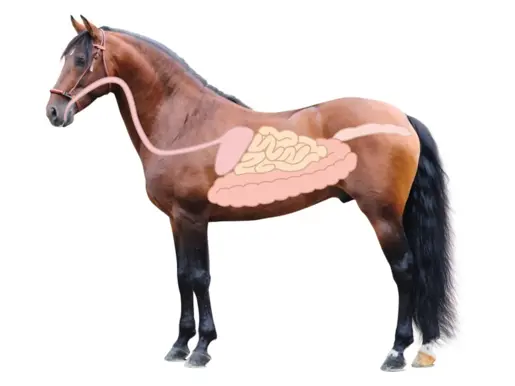
Common Stomach and Intestinal Problems in Horses
The reasons for disturbances in the gastrointestinal tract are highly diverse. They may be triggered by a change in diet, a deficiency of vitamins and minerals, or inflammation of the intestines. Stress is also an important factor contributing to problems with manure consistency. Voermeesters Stomach & Intestines provides support in these situations and can be applied in the following cases:
Watery manure
Loose or watery manure is a common issue in horses and can have many causes. Stress is a major factor, but changes in diet or even a genetic predisposition may also play a role. It is often impossible to continuously feed the same batch of roughage, and seasonal transitions between pasture and forage are inevitable. Some horses are more sensitive to these dietary changes than others.
Stress
A horse’s digestion is regulated by the nervous system. When the body is at rest, blood flow to the stomach and intestines is high. Stress, however, places the body in a state of alertness, reducing blood supply to the gastrointestinal tract. As a result, nutrients are absorbed less efficiently, which can lead to problems with other bodily functions, such as bowel movements
Foals during weaning
The weaning phase is a particularly stressful time for foals. They are separated from their mothers, must adapt to living independently on roughage and concentrate feed, and are often introduced to new herd mates. Voermeesters Stomach & Intestines supports foals during this stressful transitional phase.
Disturbances of the stomach lining
At least 60% of sport horses suffer from some degree of stomach lining disturbances. These can be caused by a lack of roughage, limited access to water, intense exercise, stress, or the use of stomach-irritating medications.
Increased physical exertion
Training or competition puts the horse under physical strain, which can increase pressure in the abdomen and push stomach acid upwards, potentially causing discomfort or irritation.
Use of stomach-irritating medications
This primarily refers to NSAIDs (non-steroidal anti-inflammatory drugs), which are commonly prescribed by veterinarians for their anti-inflammatory, pain-relieving, and fever-reducing effects. When given in high doses or over extended periods, these medications significantly increase the risk of stomach problems.

Curious if Voermeesters Maag & Darm is the right choice for your horse or pony?
Try Voermeesters Maag & Darm for at least 3 weeks. For chronic or severe cases, we strongly recommend consulting your veterinarian.
Voermeesters Maag & Darm should be mixed daily with the regular feed, which may also be a mash. Due to the relatively high content of propyl gallate in proportion to the complete diet, this supplementary feed should not exceed 25% of the daily ration.

